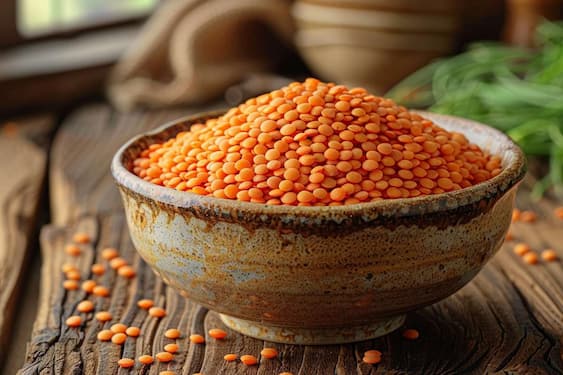Discover The Top 10 Health Benefits Of Consuming Masoor Dal

Masoor dal, or red lentils, is a popular legume in many cuisines, particularly in Indian cooking. It is not only a staple ingredient but also offers a range of health benefits. Here's a detailed look at the numerous benefits of including masoor dal in your diet:
1. Nutrient-Rich
High in Protein: Masoor dal is an excellent source of plant-based protein, making it a valuable addition to vegetarian and vegan diets. Protein is essential for muscle repair, growth, and overall body function.
Vitamins and Minerals: It is rich in several essential vitamins and minerals, including:
- B Vitamins: Important for energy metabolism and brain health.
- Iron: Crucial for oxygen transport in the blood and prevention of anemia.
- Magnesium: Supports muscle and nerve function, as well as bone health.
- Potassium: Helps regulate blood pressure and maintain fluid balance.
2. Digestive Health
High Fiber Content: Masoor dal is high in dietary fiber, which supports digestive health by promoting regular bowel movements and preventing constipation. Fiber also helps maintain a healthy gut microbiome.
Digestive Aid: The fiber in masoor dal can help manage blood sugar levels by slowing down the absorption of glucose, making it beneficial for those with diabetes or insulin resistance.
3. Heart Health
Cholesterol Management: The soluble fiber in masoor dal helps lower LDL (bad) cholesterol levels, reducing the risk of cardiovascular diseases.
Anti-Inflammatory Properties: It contains antioxidants and anti-inflammatory compounds that help reduce inflammation in the body, contributing to overall heart health.
4. Weight Management
Low in Calories: Masoor dal is relatively low in calories while being high in protein and fiber, which helps keep you full and satisfied. This makes it a great food choice for weight management and appetite control.
Satiety: The high fiber and protein content helps in satiety, reducing overall calorie intake by curbing hunger and preventing overeating.
5. Blood Sugar Control
Low Glycemic Index: Masoor dal has a low glycemic index, meaning it has a slower impact on blood sugar levels compared to high glycemic foods. This can help stabilize blood sugar levels and prevent spikes and crashes.
Diabetes Management: The fiber and protein in masoor dal contribute to better blood sugar control, making it a suitable food for individuals with diabetes or those looking to manage their blood sugar levels.
6. Skin Health
Antioxidants: Masoor dal is rich in antioxidants, including vitamin C and various phytonutrients. These antioxidants help protect the skin from damage caused by free radicals, contributing to a healthy and radiant complexion.
Anti-Aging: The nutrients in masoor dal support skin health by promoting collagen production and protecting against oxidative stress, which can help reduce signs of aging.
7. Bone Health
Mineral Content: Masoor dal contains minerals such as magnesium, phosphorus, and calcium, which are important for maintaining strong and healthy bones. Regular consumption can support bone density and overall skeletal health.
8. Immune Support
Nutrient Density: The vitamins and minerals in masoor dal, such as vitamin C and zinc, support a healthy immune system. These nutrients help the body fight off infections and improve overall immune function.
9. Versatility and Culinary Use
Easy to Cook: Masoor dal cooks relatively quickly compared to other legumes, making it a convenient option for busy weeknights or when you want a quick meal.
Versatile Ingredient: It can be used in a variety of dishes, including soups, stews, salads, and side dishes. Its mild flavor and adaptability make it a versatile ingredient in many different cuisines.
10. Environmental Benefits
Sustainable Crop: Lentils, including masoor dal, are a more environmentally friendly source of protein compared to animal-based proteins. They require less water and produce fewer greenhouse gases, making them a more sustainable choice for the planet.
